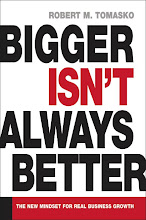November 30, 2006
3rd place may not be all that bad
I don’t usually look for management advice in The New Yorker, but the Dec 4 issue has an article by James Surowiecki (p. 44) well worth reading. He charts the evolution of the video-game industry, once ruled by Nintendo, which in the early 1990s was Japan’s most profitable electronics company. One third of US homes had Nintendo devices.
That was then. Now the industry is dominated by Sony’ PlayStation and Microsoft’s Xbox. Nintendo is an also-ran, at least in market share.
Surowiecki’s article makes the case, though, that “bringing up the rear” can be a very lucrative position to be in. He demonstrates how the old logic of GE’s Jack Welch that a company should be number one or two in its market or it should quit doesn’t always make good sense. In this three-way competition, Nintendo is making more money and doing better in the stock market than either of its bigger rivals.
Why?
According to Surowiecki:
Companies that focus obsessively on competitors and market share, according to recent academic research, tend to have lower profitability and return on investment than those who pay attention to other important performance measures. High market share doesn't automatically drive high profitability.
Surowiecki sums up his argument by noting business isn’t the same as a sporting event (or warfare): victory for one company doesn’t have to mean defeat for everyone else, especially in huge markets like global video-games that are worth $30 billion. This is a wisdom often lost when companies quest for bigness as an end in itself.
Not a bad decision.
That was then. Now the industry is dominated by Sony’ PlayStation and Microsoft’s Xbox. Nintendo is an also-ran, at least in market share.
Surowiecki’s article makes the case, though, that “bringing up the rear” can be a very lucrative position to be in. He demonstrates how the old logic of GE’s Jack Welch that a company should be number one or two in its market or it should quit doesn’t always make good sense. In this three-way competition, Nintendo is making more money and doing better in the stock market than either of its bigger rivals.
Why?
According to Surowiecki:
“Sony and Microsoft are desperate to be the biggest players in a market that, in their vision, will encompass not just video games but ‘interactive entertainment’ generally.”
“Sony and Microsoft’s quest to ‘control the living room’ has locked them in a classic arms race.”
“Nintendo has dropped out of this race….Because Nintendo is not trying to rule the entire industry it’s been able to focus on its core competence, which is making entertaining, innovative games.”
Companies that focus obsessively on competitors and market share, according to recent academic research, tend to have lower profitability and return on investment than those who pay attention to other important performance measures. High market share doesn't automatically drive high profitability.
Surowiecki sums up his argument by noting business isn’t the same as a sporting event (or warfare): victory for one company doesn’t have to mean defeat for everyone else, especially in huge markets like global video-games that are worth $30 billion. This is a wisdom often lost when companies quest for bigness as an end in itself.
“… companies can profit even when they are not on top, as long as they aren’t desperately trying to get there. They key is to play to your strengths while recognizing your limitations…Nintendo knew it could not compete with Microsoft and Sony in the quest to build the ultimate home entertainment device. So it decided, with the Wii, to play a different game entirely."
Not a bad decision.
